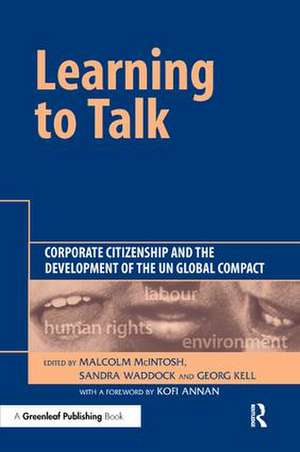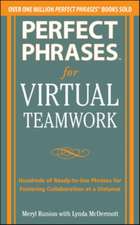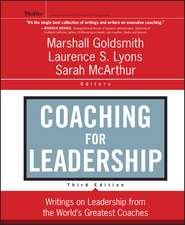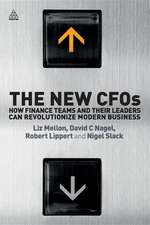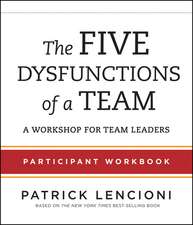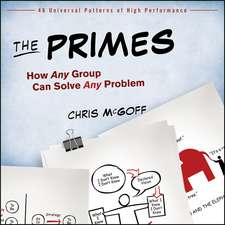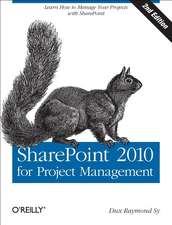Learning To Talk: Corporate Citizenship and the Development of the UN Global Compact
Editat de Malcolm McIntosh, Sandra Waddock, Georg Kellen Limba Engleză Hardback – iun 2004
Preț: 486.26 lei
Preț vechi: 572.06 lei
-15% Nou
Puncte Express: 729
Preț estimativ în valută:
93.04€ • 97.15$ • 76.83£
93.04€ • 97.15$ • 76.83£
Carte tipărită la comandă
Livrare economică 15-29 aprilie
Preluare comenzi: 021 569.72.76
Specificații
ISBN-13: 9781874719755
ISBN-10: 1874719756
Pagini: 432
Dimensiuni: 156 x 234 x 28 mm
Greutate: 0.84 kg
Ediția:1
Editura: Taylor & Francis
Colecția Routledge
Locul publicării:Oxford, United Kingdom
ISBN-10: 1874719756
Pagini: 432
Dimensiuni: 156 x 234 x 28 mm
Greutate: 0.84 kg
Ediția:1
Editura: Taylor & Francis
Colecția Routledge
Locul publicării:Oxford, United Kingdom
Public țintă
Postgraduate and Professional Practice & DevelopmentCuprins
Foreword Kofi Annan, Secretary-General of the United Nations Introduction Malcolm McIntosh, Independent Commentator, Sandra Waddock, Boston College, USA, and Georg Kell, UN Global Compact Part 1: The origins and development of the UN Global Compact1. An Appeal To World Business: 31 January 1999 Kofi Annan, Secretary-General, United Nations 2. The theory and practice of learning networks John Ruggie, Harvard University, USA 3. The Global Compact Network: an historic experiment in learning and action Georg Kell, UN Global Compact, and David Levin, University of Pennsylvania, USA Part 2: The Global Compact and human rights4. De-compacting the Global Compact Tom Donaldson, Wharton School, Philadelphia, USA 5. Business and human rights Klaus Leisinger, Novartis Foundation for Sustainable Development and University of Basel, Switzerland 6. Operationalising the Global Compact with a focus on the human rights principles: learning to walk the talk Erroll Mendes, University of Ottawa, Canada 7. Institutionalising global standards of responsible corporate citizenship: assessing the role of the UN Global Compact Mara I. Hernandez, Massachussets Institute of Technology, USA Part 3: The evolution of the UN and the UN Global Compact: critical perspectives8. Growing big, learning that small is beautiful Cornis de Lugt, United Nations Environment Programme, France 9. Flags of inconvenience? The Global Compact and the future of the United Nations Jem Bendell, Nottingham University Business School, UK 10. Labour and the Global Compact: the early days Jim Baker, International Confederation of Free Trade Unions 11. The UN Global Compact: a triple-win partnership Michael Hougard Pedersen, Novozymes, Denmark Part 4: Action and learning12. Reflections on the Global Compact Chris Tuppen, British Telecommunications, UK 13. Learning from company engagement with the Global Compact: the First Global Compact Learning Forum, Denham, UK, November 2001 Malcolm McIntosh, Independent Commentator, and Ruth Thomas, Sustainability Researcher 14. Learning from experience: the United Nations Global Compact Learning Forum 2002 Sandra Waddock, Boston College, USA 15. Learners and leaders: evolving the Global Compact in North America Sandra Waddock, Boston College, USA 16. Pfizer: a New Mission in Action Nancy Nielsen, Pfizer Inc. USA 17. Learning from doing: The Third International Global Compact Learning Forum Meeting in Belo Horizonte, Nova Lima, Brazil, December 2003 Malcolm McIntosh, Independent Commentator 18. Shaping the future by walking together: Novo Nordisk's promotion of human rights and good environmental management, with specific reference to an evaluation of suppliers in 2002/2003 Malcolm McIntosh, Independent Commentator, and Annette Stube, Novo Nordisk Part 5: The unfolding world of the UN Global Compact19. Responsible excellence pays Claude Fussler 20. The Global Compact as a new organisational form: a global action network Steve Waddell, Global Action Network Net, USA 21. Learning by doing: the Global Compact and the ethic of corporate citizenship James E. Post and Tanja D. Carroll, Boston University, USA 22. The living world of the UN Global Compact Malcolm McIntosh, Independent Commentator 23. The UN Global Compact Cities Programme. The Melbourne Model: solving the hard urban issues together David Teller, Committee for Melbourne, Australia 24. The Global Compact: promoting convergence in corporate responsibility Deborah Leipziger, Consultant, Corporate Responsibility Part 6: Taking off25. The Global Compact: selected experiences and reflections Georg Kell, UN Global Compact 26. Vision and action: the possibilities of action research Gill Coleman, University of Bath, UK 27. The future Malcolm McIntosh, Independent Commentator, Sandra Waddock, Boston College, USA, and Georg Kell, UN Global Compact Appendix A: The Millennium Development GoalsAppendix B: The Global Compact Advisory CouncilAppendix C: Global Reporting Initiative indicators for progress on the UN Global CompactAppendix D: Results of the consultation process on the introduction of a principle against corruption Bibliography
Recenzii
A collection of key writings about the UN Global Compact by some of the leading actors to date.
Industry and Environment, April–September 2004
Industry and Environment, April–September 2004
Notă biografică
McIntosh, Malcolm; Waddock, Sandra; Kell, Georg
Descriere
This book draws together contributions from leading players in the Global Compact to reflect the aims and origins of the initiative; some telling of stories of engagement; and explanation of how this initiative has quickly become an important reference point in the dialogue on global and corporate governance.
